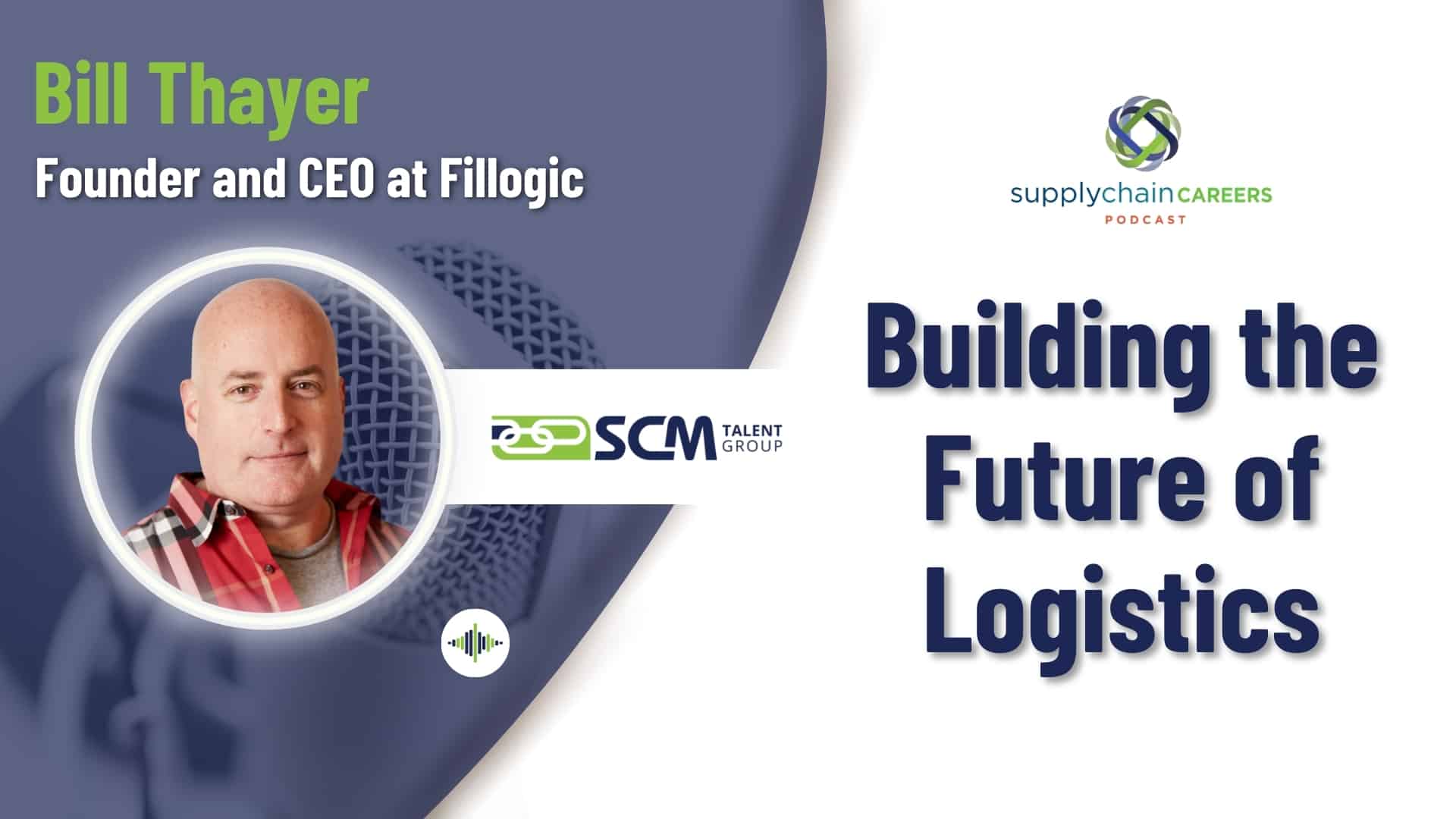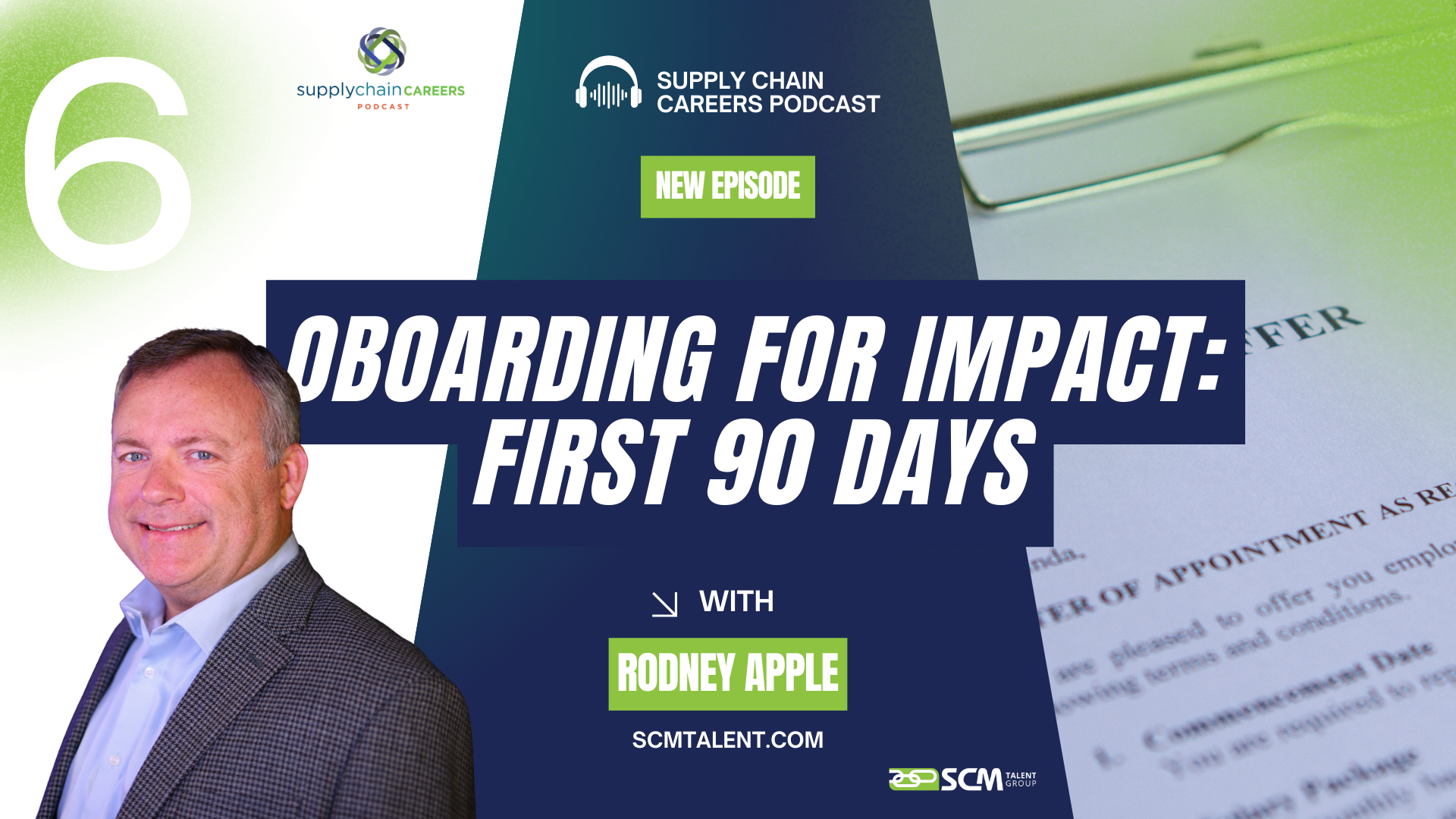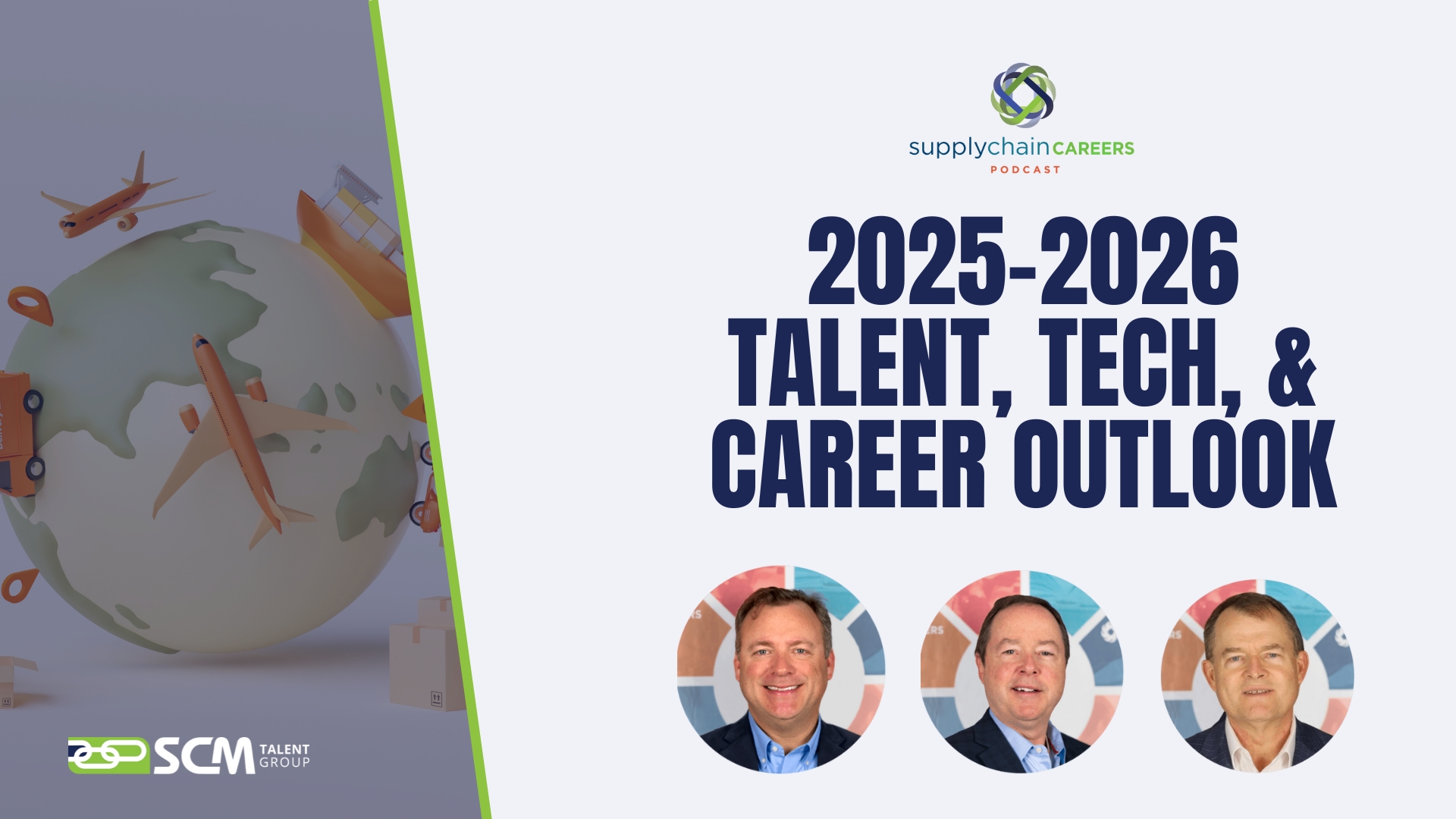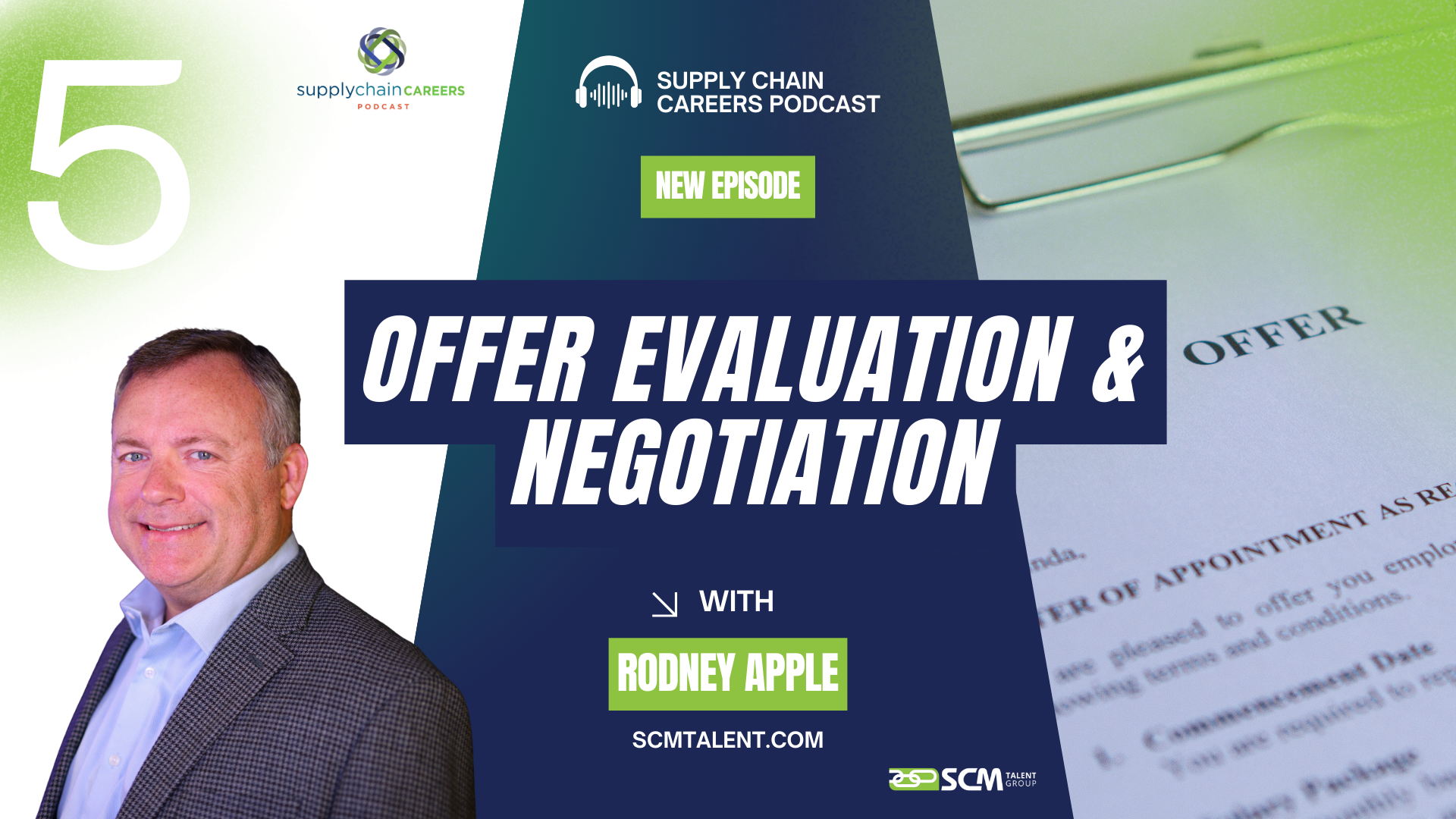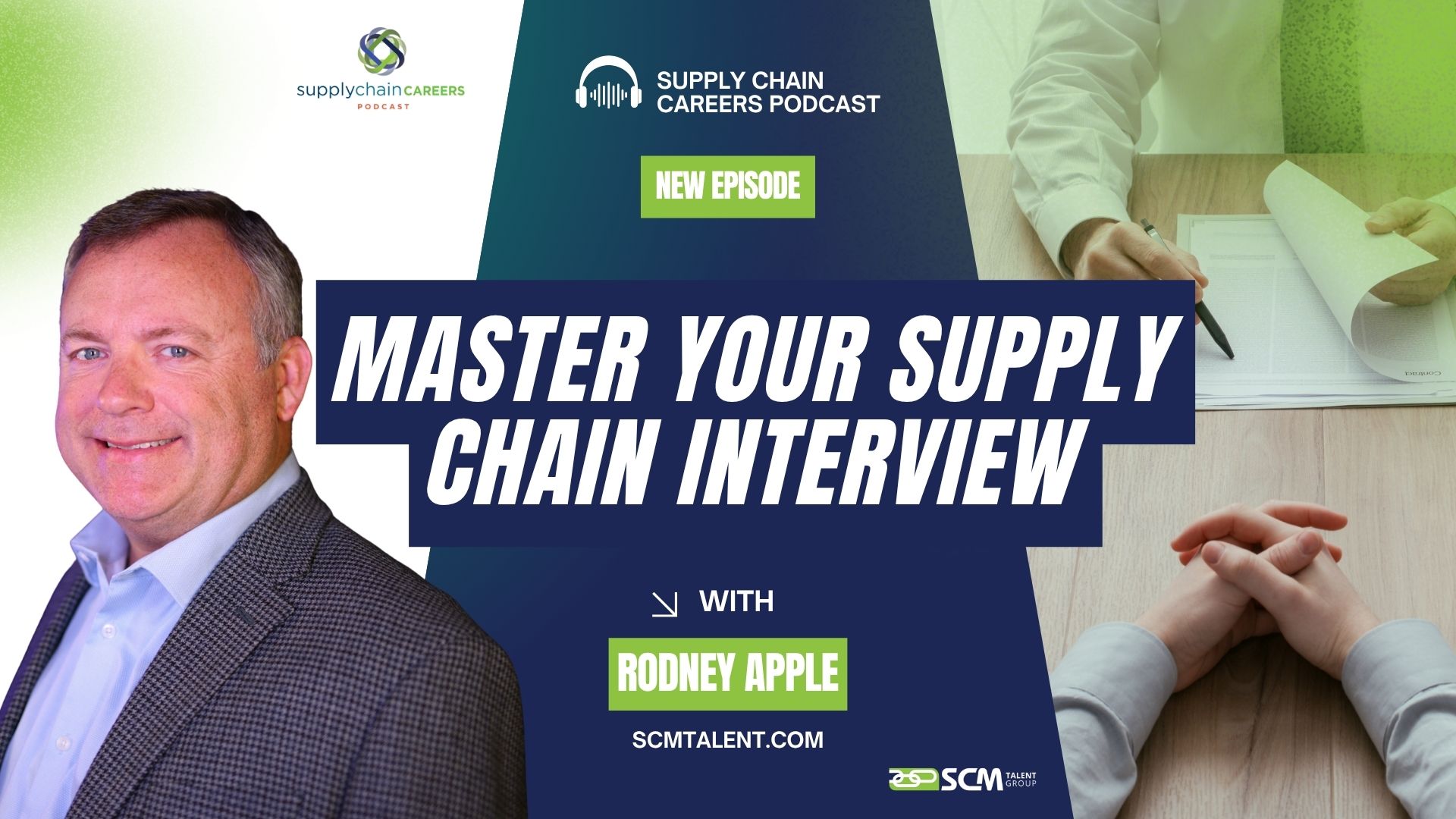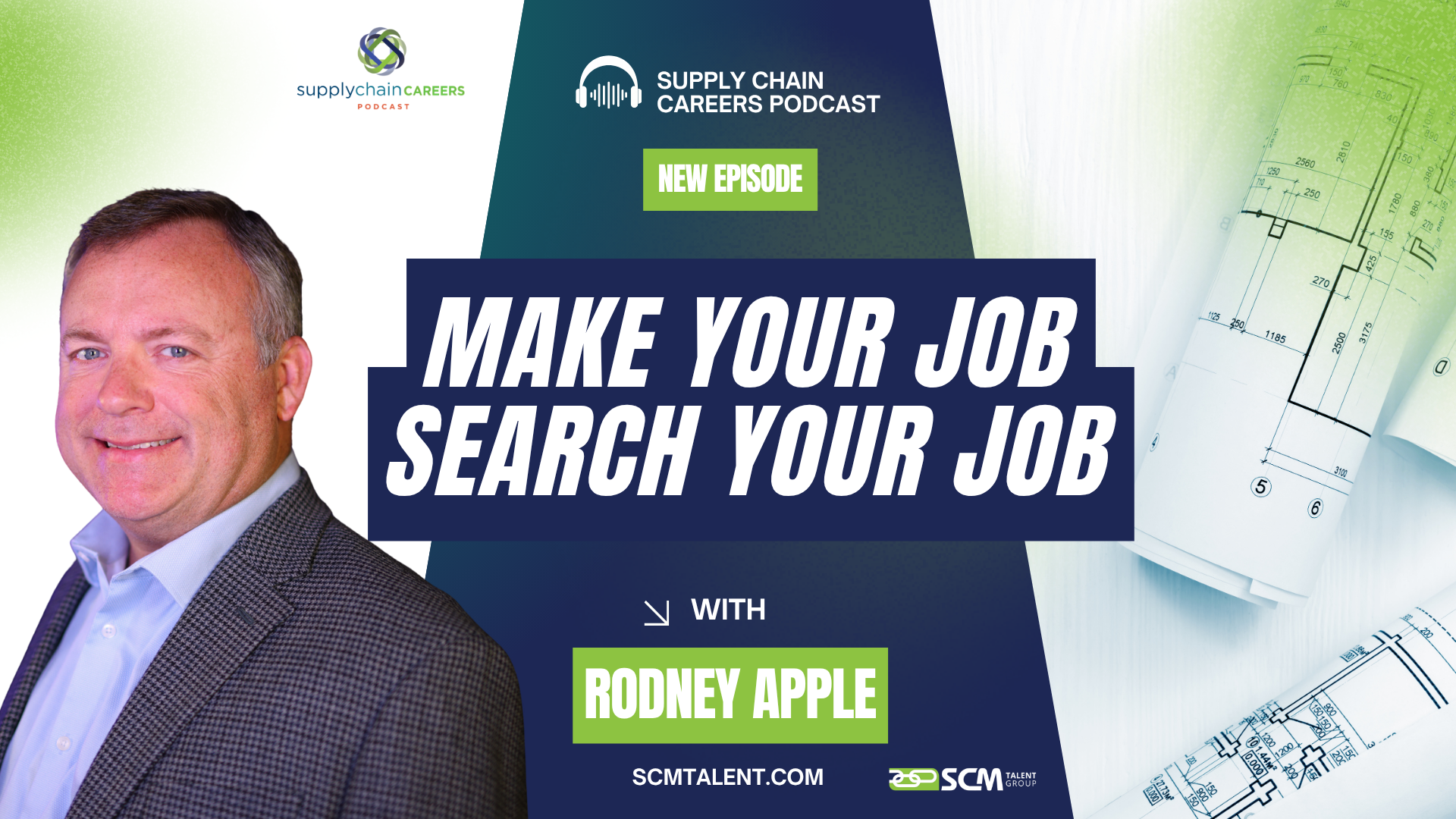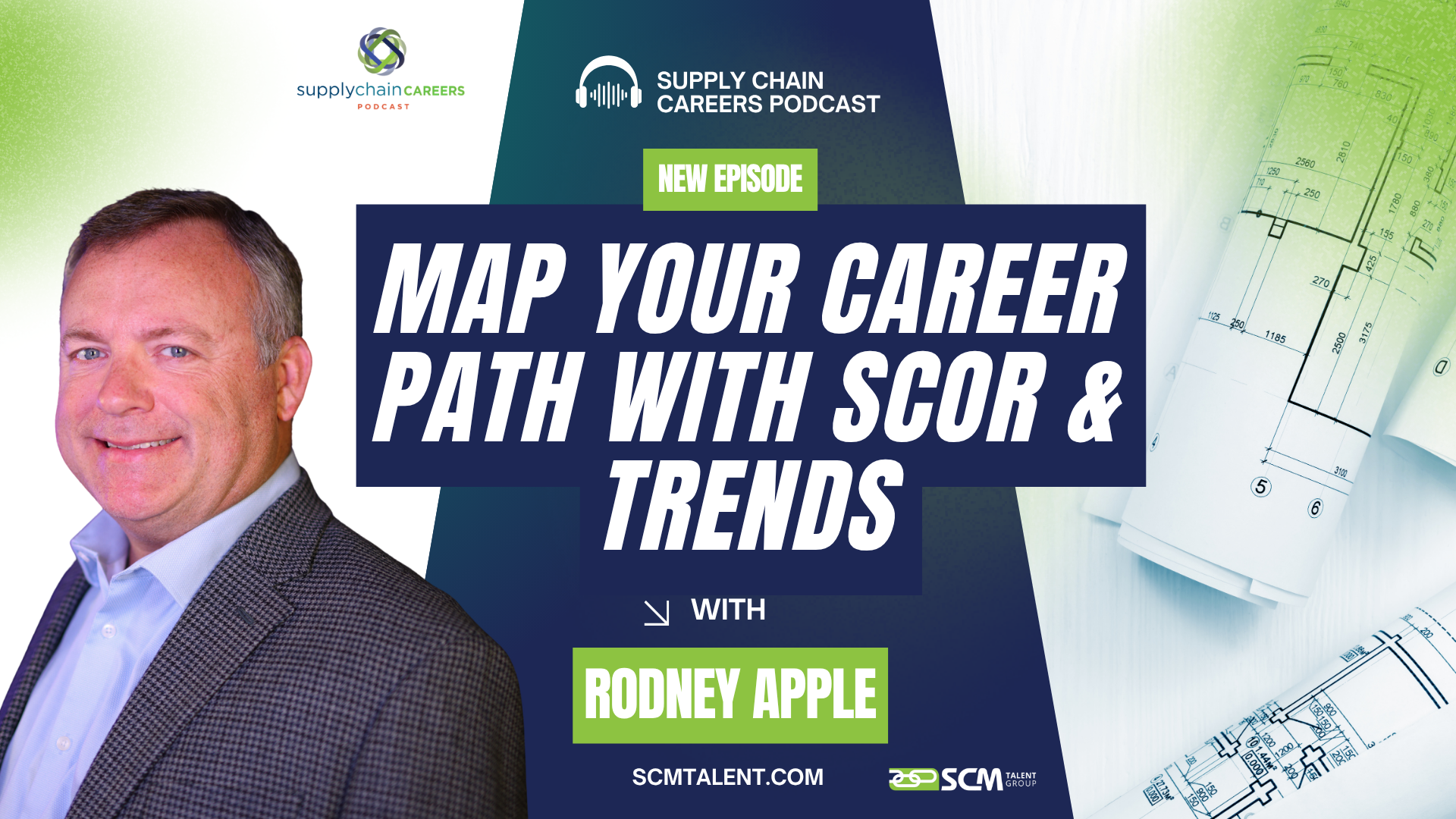[00:00:00] Mike Ogle: Welcome to the supply chain careers podcast. The only podcast for job seekers, professionals, and students who are focused on career enhancing conversations and insights across all aspects of the supply chain discipline. This podcast is made possible by SCM talent group, the industry leading supply chain executive search firm.
Visit SCM talent group at scmtalent. com in this episode of the supply chain careers podcast. We speak with Bill Thayer, founder and CEO of Phil logic, who has over 30 years of experience with companies such as Lowman’s. Century 21 stores. Bill tells us how to get started in logistics for his 19 years at Lowman’s, taking on greater responsibilities on his way up to COO and CIO, and what he learned along the way about investing in technologies that decrease costs and improve efficiencies.
Bill explains how logistics tends to be rules based and process focused, making it a good match for applying technology. Bill also provides his thoughts about how supply chain careers are changing, particularly in how we collaborate, and his best pieces of advice, including always keeping a focus on the big three of people, process, and technology.
He tells us how to pursue channel free logistics and local market logistics thinking in retail. Bill closes with his thoughts about how people should face supply chain challenges. I’m your podcast co host, Mike Ogle. And I’m your podcast co host, Rodney Appel. Bill, we’re happy to have you with us today.
Welcome. Happy to be here. So how did you get started in supply chain? What were some of the greatest influences that got you started and got you where you are today?
[00:01:54] Bill Thayer: Sure. I got into supply chain more as a goof. I started my career over 35 years ago as a merchant. So I went through the bar training program at Macy’s.
So I was in stores, I was in buying line. I ended up in planning and allocation. And I was at Macy’s for around 7 years, and it wasn’t until I went to an off price retailer called Lowman’s, at it’s peak it was about a half a billion dollar retailer, where I helped start the planning division. And at that time, the controller, who eventually became the chief operating officer of the company, he was making comments to me, he goes, I don’t understand why all the merchandise that are under your name.
Purview in sportswear is getting out of the buildings and nobody else is getting out of the buildings because I’m following up with the logistics people. And so he said, we have a problem in logistics and maybe you can help me figure it out. And I said, I don’t know anything about logistics. And he said, I don’t know either.
Let’s figure it out together. So logistics is one of those businesses where if you want to take control over it, you will get access and they will give it to you. And it’s one of those great businesses that. If you want to take over the dumpster fire that these businesses can be, I think can be very rewarding, be very interesting.
You name it. Lowman’s was an off price retailer. And so when you think about off price retail, it’s pretty like 52 pickup. It’s always a mess being able to try to work that merchandise, but we figured it out, we added some additional technology in. It was when I think back in 2002, we put in a hanging garment sorter, which is our first kind of foray into unit sortation, and it completely changed our business.
It was unbelievably contributing to positive growth, major efficiencies for the business. And because of that, it really hypercharged my career in logistics. When you change things extremely In an organization where you remove costs, improve efficiencies, you’re able to do a lot of stuff. So it was great.
We had a real, some major benefits. So we started in really investing in a lot of additional technologies. And that was great. And so after that, after about seven years of running supply chain, I then became the chief information officer as well. And at the end of my time at Lowman’s after almost 19 years.
I was the chief operating and chief information officer. So all those great things that I learned in supply chain and technology are pretty much applied to everything I’ve done since then. I spent some time after Lowman’s helping build out Macy’s backstage, which is the off price division of the larger department store.
And at the same time, I worked very closely at Century 21 stores, which is a larger off price supply chain, larger off price retailer. And helped build that before I came up with the idea for Philogic. So when you look at my career, Pretty varied, lots of interesting things, but the logistics side of the business was something that I was pretty good at and it, I wouldn’t call it my first love, but it’s what’s interests me the most logistics and logistics technology.
[00:04:48] Rodney Apple: Yeah. And to follow up with that bill, having recruited in this logistics supply chain space for over two decades, it’s extremely rare to see someone cross those boundaries at that level of leadership, chief logistics officer, CIO or CTO, and you’ve got. Both ends of that spectrum. How would you say that that experience has shaped out the last few years where you’ve been more of that entrepreneurial bet versus corporate, what have you learned from, from segueing and what are some of the results that you’ve been able to achieve with launching these new businesses, including the logic?
[00:05:25] Bill Thayer: I think the most important things is everybody’s got problems and most businesses and logistics and technology are very similar. So it’s all about people process technology. And then if you can get all those things right, then you can add some additional automation specifically in logistics. So one of the things I always loved is running a technology operation.
No better group of people to run technology groups than logistics folks because logistics folks are rules based process focused. And extremely targeted on what’s the benefit on the logistics snob. So I think everything’s about logistics. And when you think about data and technology, logistics is the process of moving something through a system.
That could be people that could be processed, that it could be any number of different things. And so everything about logistics process is relatable. And so I think you can relate it to any sort of business, whether. As a retailer, a shipper, we were dictating terms to potential service providers. But in what we do in Philogic, we’re a solution provider.
So I’m pretty comfortable saying, yes, I’ve been where you’ve sat. Retailer, brand, I understand your problems, whether it is a large department store, specialty retailer, off price retailer. When we built out what is the logic now, so much of it is we’re an intense supply chain solution. So we have lots of different options to meet retailers and brands where they are.
And that’s a huge component of what’s important about this business.
[00:06:55] Mike Ogle: And I want to say on the record, we love logistics snobs. My wife doesn’t that much, but she’s after 30 years of marriage, she’ll put up with me for a while. Short conversations about work.
[00:07:08] Bill Thayer: Exactly.
[00:07:10] Mike Ogle: So. At Philogic, what kinds of internal team skills, both hard and soft skills, tend to matter to you the most as you work within teams at your own company?
[00:07:21] Bill Thayer: Sure. You know, Philogic at its core is a pretty weird business. So we take underutilized spaces in retail centers, predict shopping malls, and provide the technology and the operations to make those buildings operate more efficiently as an ecosystem. It’s not your traditional 200, 000 square foot warehouse.
40 foot clear, you name it. It is taking existing infrastructure. And because of that, a lot of the standardized logistics, how people understand fulfillment or even micro fulfillment don’t always apply. And so it is very much as we’ve built up the business over the last couple of years, it’s understanding what works.
And understanding when things don’t work. I think one of the great things is a lot of the folks that I’ve worked with over the last 30 plus years, work with me now and for logic, which is great. And that’s very helpful, but we’ve also brought in a lot of new people. So I think the most thing when we bring in new individuals, if you’re from within industry, from within logistics.
Three months, you’ll learn the business. If you’re from outside of industry, we can teach you this in around six months. But the most important piece is what we call open to learn OTO. You need to be open to learn new things. One of the things that we’re very skeptical of is somebody with a very detailed supply chain background, like Amazon, Amazon employees love that business.
They do some phenomenal things. Not always a real good fit for what we do. So this is why we are. We spend a lot of time focusing on bench strengths for assistant managers and supervisors that start with us. We do a lot of promotions from within because as these people have worked through multiple buildings and understand how we do things.
Makes life very simple, which is great. Everybody learns from within and that allows us to do a lot of things. That’s that I think is an important piece when we start talking about how we manage and work with people. If you can’t work within a team environment. It’s not going to work. There’s a term that I’ve learned over the years, hero culture.
Hero culture is death to a business like us. There are no heroes. Everybody has to work together and understand that everybody has worth and has value. And if, once again, if you can’t work as part of the teams can be a problem.
[00:09:34] Rodney Apple: Those are good perspectives. Bill want to touch on your experience. Obviously, you’ve worked on the client side heavy and retail spanning that technology logistics leadership roles that we touched on earlier.
Now, you’re on that vendor or service provider side of the house. So you have that unique perspective there as well. Would love to hear how. Those perspectives experiences I’m straddling. Those sides have benefited you. And what advice do you have for that vendor client engagement spanning from the discovery phase?
We’ve got an issue. We’ve got an opportunity. We’re scoping it out through the solution development. And ongoing from implementation and support,
[00:10:16] Bill Thayer: I think, from the logic side, when we’re talking with new customers, I think the most important thing is, hey, we talk about what we do, and there’s a lot of things that we do, but we take what we call the logistics, Swiss army knife approach, Swiss army.
Nice. Got lots of different things, but we always talk with particular partners and saying. What’s the big blade? What’s the big issue that you’re trying to solve? And what we’ve learned, we solve that issue. Then there’s a lot of additional conversations on additional things that we can resolve, uh, together.
And I think that’s the important piece is understanding that since we do a lot of things two, three years ago, primarily did fulfillment. Um, but now the fulfillment we do is B2C, B2B, wholesale, dropship. We have a massive reverse logistics solution that we’ve built out that includes returns, re commerce, standard liquidation of product.
Then we also have a last mile aggregator. There’s lots of different things that we do, but we say to the brand or the retailer, what’s the problem you’re trying to solve? What’s your immediate problem? Let’s figure out how to work through that. And then people come back to us for more things, whether solutions that we offer, or what we find is pretty interesting is if we can collaborate with retailers or brands together on something new.
That’s interesting to us as well. Because once again, the ecosystem only works on partnerships and. We’re not looking for more customers. We’re looking for more partners because partners are what you will grow with together.
[00:11:42] Rodney Apple: Yep. It’s on the returnability as a follow up, Bill, you mentioned understanding the brands and the retailer and that ecosystem.
What about external partnerships? I read something that you’ve launched a partnership with Returnity. And I’d love to hear more about that. And you know how that helps with sustainability as well. Cause you touched on that earlier too.
[00:12:03] Bill Thayer: Yeah, I think at the high level, when you talk about. Sustainability and circularity, believe it or not in the logistics world, circular and sustainable sustainability are core partner platforms or core, you know, portions of our business, because logistics focusing on circular and sustainability is actually a good business.
It’s more efficient, less touches and all those things that you can do in the middle mile, which is where we operate shares in. Saves a lot of money and time and of course, less impact on the planet. So when you look at Returnity, so Returnity, basically they build reusable containers. And so along with Returnity, as well as one of our investors, portfolio companies, a company called Renegade Recycling, we’ve come up with a container that is a hundred percent recyclable.
So there’s lots of containers that are reusable. You can recycle, corrugated, but corrugated doesn’t have as many trips. So we’ve come up with a container. Um, that is a multi use container, but that actually can be recycled. And as we work with customers, everyone is looking for some of those innovations.
So we look at ourselves as a solution provider. We look at ourselves as an innovator. And in many cases, we’re a platform to experiment and learn and work together on additional solutions to improve the bottom line for retailers, but at the same time, have good solid circularity impact.
[00:13:26] Mike Ogle: Thank you. End. If you look back and was able to tell your younger self, Hey, by the way, it turned out you were in supply chain.
What could you have better done to prepare yourself to be ready for that career?
[00:13:41] Bill Thayer: Look, my original goal coming out of college was to go in the Marine Corps. That’s all I ever wanted to do. And it was funny. I had a. A defect, a kidney defect, which kept me out. Not a mental defect as some people would say, but a physical kidney defect.
And I just applied for a bunch of jobs and I was accepted into Macy’s bar training program. I was like, you’re going to take me 22 years old and put me through a training program and run an organization. I don’t know anything about retail. Plus, as I’d come to retail, it was like slinging hamburgers and I was a lifeguard for many years.
I was it. And then if you had told me logistics, I knew nothing about logistics through most of my years starting in my first seven years in retail. Like I said before, when we started, I stumbled into this business and I think what’s been interesting about it is logistics is the part of retail where you can truly.
Be very collaborative, not only within your company, but also with other people that are, whether they’re competitors or whether they’re in the market. So much of the innovation that I’ve seen over the last 20, 30 years is. Through collaboration. We talk about partnerships, the partnerships that we’ve built in Philogic, Returnity is one.
But when you look at our returns partners, people like Loop and Narvar, Aftership, other folks that were, you know, putting onto the platform. So much of it is we’re taking something that I’ve always believed in. And standardizing making a part of a business. And so that to us has been, that’s, what’s always been really interesting about this business.
But as far as what I’d tell my younger self, I probably would have said pay more attention in school because maybe you wouldn’t be working in retail logistics, but it is what it is.
[00:15:20] Mike Ogle: During this short break, we recognize that this podcast is made possible by SCM talent group, the industry leading supply chain executive search firm. Visit SCM talent group at scmtalent. com
[00:15:35] Rodney Apple: this week. Gleam into the future, and I know I’ve seen the kind of the career landscape over the years on the recruiting side has, has advanced and it’s changed quite a bit.
What are your perspectives there, Bill, on what maybe the future of logistics, supply chain careers may look like as these technologies continue to advance AI, machine learning, et cetera?
[00:15:57] Bill Thayer: So, I think. What really concerns me the most about the future is logistics is still a people business. The vast majority of it is run by people things moved by people.
I think we’re a little bit robot crazy in the company or in the country. I’d like to think that robots as a service becomes a little bit more efficient. I’m a huge fan of automation, but I think the core tenants of that people process and technology. Still hasn’t changed. I don’t know if it’ll ever change, at least not in my lifetime, but I think what’s important is I think we see this in the greater population is the inability to communicate.
Everybody’s so focused on their phones, right? And I’m on my phone all the time anyways, but the ability to communicate face to face because we’ve been post COVID going to conferences, it’s always great to be out and about in communication with people. I think that’s an important piece for, I think. Don’t lose the importance of the fact that people are going to communicate face to face.
I think that’s a huge component to the business.
[00:16:59] Mike Ogle: So Bill, the market that you are addressing is pretty new and constantly changing. How do you keep up with the changes in the industry yourself and how do you advise others to stay on top of new developments and new opportunities?
[00:17:14] Bill Thayer: Sure. And so I think a lot of that is the partnerships.
And we learn new things through our work with our partners, whether it’s our brand and retail partners or our solution providers or our technology partners. We’re always talking, we’re always talking about, Hey, how do we resolve this? And I think what’s been pretty interesting, logistics technology has grown tremendously over the last three years, but it still goes back to a lot of folks is they need the technology, but they also need the operations and need the infrastructure.
When you think about it, logistics infrastructure, specifically the industrial real estate. It’s never been more expensive. There’s a lot more capacity about that now, but I think one of the key things is there is really nothing out there that precludes anybody from jumping into this space. But I think what’s most important is everybody collaborating together.
You really have the ability to build some interesting things together. So the collaboration, the ecosystem, I think that’s the important piece.
[00:18:15] Rodney Apple: And Bill, you mentioned getting into the business. We’d love to go back to, to the beginning and how you identified and seized upon this opportunity. Part one question.
And then I think part two is, could you get a little bit more into detail? What do, how do you engage with your clients going through the benefits and what they can expect as customers from, from your service offering?
[00:18:37] Bill Thayer: From the business perspective. Always understanding, trying to figure out how these large distribution centers interact with physical retail because 75 percent of retail business is still done from a physical location.
But when you think about how logistics technology support physical retail, deploying a WMS in stores, in many cases, not very efficient or effective. So I saw there was a big gap with how physical retail is being serviced logistically. I said, Hey, if you could get. The logistic solutions closer to the region where the stores are what we call the middle mile.
I think there’s an opportunity to make better utilization of inventory. The term currently right now is omni channel retail for big believers that omni channel is an old process omni channel with channels. It denotes walls. It denotes friction. And our whole point is. With what we call channel free logistics, we are looking at the future, which is customers don’t shop in channels.
So if they’re not shopping in channels, how do we match inventory and processes to match what the customers need? So I saw that back. Oh, God, 2015, 2016, I was working with another company for a while that had a different idea. And my whole point was. It’s the using the retail centers as infrastructure.
Let’s utilize that infrastructure to deploy in aggregate, right? Logic is B2B logistics infrastructure, but we’re agnostic mall owner, retailer carrier agnostic. It’s all about this ecosystem. So we started the company in 2018. We started doing revenue in 2020, right? During the middle, middle of the pandemic, we’ve grown pretty majorly over the last couple of years.
And I think what’s happened is. And this goes back to the partnership piece of it. It was always about building a platform and we were working with a lot of digital native brands, but now it’s really become more of, hey, there’s an ecosystem that we can do to support not only the brands, but also the infrastructure where they inhabit, which is malls.
How do you drive traffic? How do you use those? As aggregated fulfillment hubs, because realistically they already have the best space. They’re already closest to the target consumer. The way I’ve always looked at it is malls have four pillars of what the four pillars of physical retail is, which is of course, retail stores, food, experiential, but they’ve always missed that fourth pillar, which is logistics.
And we think we bring that in aggregate. And so as we’ve continued to build out the infrastructure, it is how do we expand? How do we continue to expand this business and continue to take it to the next level? And that’s where we’re at. And that’s where the partnerships help us.
[00:21:14] Mike Ogle: Yeah, that’s great. Bill, I think we’ve had a lot of guests on the podcast talk about how they’ve learned from facing adversity, failing fast, learning, growing.
Can you share a couple of examples of key career challenges that you faced along the way, how you dealt with them, and how did those changes really help you grow?
[00:21:37] Bill Thayer: Yeah, I think for me personally, I’ve been through five retail bankruptcies and two liquidations for the most part. I’m usually that process worked out pretty well for me because company went through a change.
I ended up on the better end of it, but I think one of the key things that’s always been important to me is where does it go sideways? And I think there’s always some component of the business that’s a little shaky logic. We deal with these types of things all the time. Is it customer or there’s something internally that we’re working on?
The idea is run in circles, scream and shout doesn’t seem to work. It is always about staying focused and working the problem as best as we possibly can. That’s the important piece, got to work the problem. I think the other piece is that the businesses will continue to grow and evolve. And one thing that I’m trying to really hone in on is it’s different from being at a retailer, specifically a larger retailer.
There’s a larger retailer, you’re somewhat insulated. On the early stage venture side of it, once again, I started my first company when I was 50. Early stage venture is for younger people. And I think that’s the most important piece that we’re working through now, which I think is important is really ensuring that how do we build this business for scale over time?
And that’s always a constant challenge.
[00:23:01] Mike Ogle: And a quick follow up. What’s been your experience in trying to get this rolling from the first pitch or two that you ended up making to people that might not normally be looking at the logistic side of things and mall owners and operators to be able to get them over the top to say.
I get it and I understand how this works for me.
[00:23:26] Bill Thayer: I think the most important piece is your pitch is always evolving. What I envisioned the business would be when we started it years ago hasn’t changed at all. How we speak about it has because logistics people are nuts and bolts people. How do you make these things work?
And One of the things that I think is pretty interesting on our side, one of the things that we are trying to do is talk about new solutions, like channel free logistics is a new concept. Local market logistics is a newer concept. It’s been called different things, but how do you get adoption? And that’s always been, it’s art more than science, and I think that’s an important piece of just how do we figure this out.
[00:24:12] Rodney Apple: Bill, you’ve shared some great perspectives and advice, uh, but would love to hear as you look back on your career, your very diverse career, spanning all kinds of different areas, what’s some of the, maybe, A couple of most impactful things in terms of advice and wisdom that you’ve been given that have really made an impact on your career.
And is there anything you’d like to offer our audience in terms of the career development and general advice?
[00:24:37] Bill Thayer: I’ve had very, I’ve had, I can count them on one hand, very, very good mentors, partners, and people that were, have been very good to me. I mentioned before my CEO, Mike, it was originally a controller at Lomans who eventually became the COO, a gentleman named Bob Glass.
I worked him directly for 10 years and he provided me more information and more feedback for. How to run an organization, uh, learn so much from him at the same time, the head of HR at Lowman’s, and then she was the head of HR at Century 21 stores. Who’s now the head of HR at Children’s Place, a woman named Nancy Strafez.
She really gave me the guardrails of understanding how to hire, develop and manage executives. Your people are your most important strength. And I would always say to people, I’m like, Hey. And many of the companies I worked at, I’m like, these are not your people. When I hear people would say, this is my team.
I would always say they’re Nancy’s people. You have them on loan. So don’t screw it up. Bob and Nancy still, I’m very still close to them as well. Some of my closest. Partners have usually been on the merchant side. So a woman who’s a cheap merchant at Lowman’s, still a good friend of my woman named Leslie Heller.
She was awesome because she got to the point where merchants, they just want to have their good service properly. We just got to the point where she’s, as long as you do your job, I can do my job. And then we’ll get to the point. I’m like, look, go buy something themselves. I’ll figure out the rest and we had a really great partnership there and I think those are the relationships that are very important.
Now, at the same time, I’ll also throw it out to some of my senior management. That’s here at logic today. I won’t call any of them out because they know who they are folks that I’ve worked with for some cases, more than 25 years. We’ve worked together for a long time. We have a pretty good cadence and they also understands how we like to manage and how we like to be collaborative as best as we possibly can.
So, that’s it from the perspective of people that I’ve learned from and I think what it all rolls down to is. This is work. I have a family, been married almost 30 years, and my wife and my kids are everything. You can’t forget that. That’s the important part.
[00:26:54] Mike Ogle: And I want to toss in one more question before Rodney gets to the last question there, and it goes back into this with mentorship and advice.
Trying to get a little bit of philosophy on mentorship. Are you, do you currently have mentors? Are you mentoring others? And how do you think those kinds of relationships really work out best?
[00:27:18] Bill Thayer: I have a lot of people that I stay connected with in the supply chain. When I look at, so who am I mentoring?
People are flawed no matter how young or how old they are. So I don’t want to put myself as. I get nervous with that term. I’ve been said a couple of folks, he’s my mentor. I’m like, I don’t look at it that way. I look at a person that provides you device advice or direction. I get a little oogie on that.
If anything, I’m my kid’s parents and my wife’s husband. And other than that, I’m just the person that works here. In most part, I get asked sometimes, Mr. Thay, I’m like, my name’s Bill. Nothing more than that. At the end of the day, we come in life one way and we go out the same way for the most part. We’re just people are people.
Not to mention, look at me.
[00:28:11] Rodney Apple: Bill, we appreciate you providing more details on this fascinating company. That’s it’s such a fascinating niche and obviously it’s growing. So congrats on your success, but for our audience that’s listening, where can we find more, where can they find more information on the logic and I know you’re active in the trade shows and conferences, so we’d love to hear what’s, what’s on deck for 2024.
[00:28:36] Bill Thayer: Sure. Once again, we’re continuing to expand the network. I think if you want to see and learn more about us, just go to our website for logic. com, F I L O G I C. com. Just think about it as logical fulfillment switched around. We were recently at manifest conference. We’ll be in Vegas at shop talk in March.
We will also be at the circularity 24 conference in, I believe it’s May. Then we’ll be at home delivery world in June in Philadelphia, but we’re around, we’re out there all the time.
[00:29:06] Mike Ogle: All right, Bill. Thank you very much for a great conversation and all the insights that you’ve provided about supply chain careers.
My pleasure. And I thank you all for having me. I appreciate
[00:29:16] Rodney Apple: it. Thank you, Bill.
[00:29:21] Mike Ogle: Thanks for listening to this episode of the supply chain careers podcast. Be sure to listen to other episodes and sign up to be notified when future episodes are released. As we continue to interview industry leading supply chain experts, this podcast is made possible by SCM talent group, the industry leading supply chain executive search firm visit SCM talent group at scmtalent.com.
